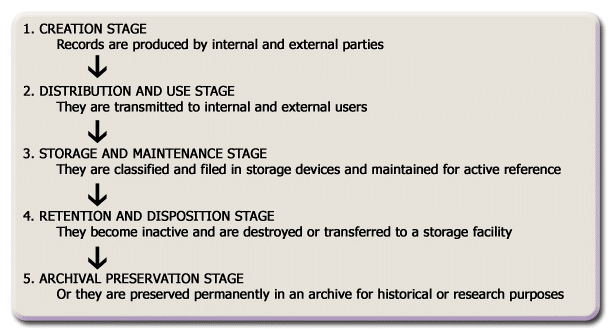Records Management

Definition
Records Management is that field of general administrative management which aims at attaining economy and efficiency in the creation, receipt, maintenance, use, storage and the disposal of records during their entire life cycle.
What is a record?
A record is any material that contains information, example: any paper, correspondence, book, microfilm, card, magnetic tape, CD-ROMs, floppy disk, map or any copy of a print out, that has been created or received by an organization or its successors . Records are essential in the conduct of the day-to-day activities of all organisations. They provide evidence and information about these activities.

Records management provides a framework to enable these actions to be undertaken. It aims to ensure that:-
- records serve the purposes for which they were created;
- records are managed in an effective and efficient way;
- records are housed in such a way that they should be retrieved quickly;
- the growth of records is controlled at their very inception;
- the costs of keeping records are at the lowest possible;
- there be regular disposal of non current records (PRAC, Retention Schedule);
- records of archival value are retained permanently;
- records which are needed for legal, administrative and fiscal purposes are retained; and
- records are kept in a secure place.
In order to reach its goal, that is, to achieve economy and efficiency in the creation, maintenance, use and the disposal of records, a good records management programme is needed. This programme includes, amongst others, a performing Records Centre.
The Records Centre
The Records Centre has been created under Section 25 of the National Archives Act No. 22 of 1999; it is an important component of the National Archives. The Records Centre is administered by a Records Manager.
The Records Centre plays a significant role in the management of public sector records. It supports the entire records management process. The Records Centre is the intermediate repository to house non-current records which have been appraised by the Public Records Appraisal Committee. Once these records are received, they are treated, classified before they are sent to the National Archives for permanent preservation.
Records Centre is a treatment station where the following operations are carried out:
- receipt of records from creating/depositing agencies;
- cleaning and disinfecting of the records;
- listing, working out of checklists and inventories of the records;
- arranging the records according to the Principle of Provenance and Original Order; and
- placing the records in acid-free boxes and other containers and shelving them.
Records kept at the Records Centre are not made available for consultation to the public during their stay there.
Disposal of Records
The National Archives Department ensures the proper disposal of records to achieve efficient, transparent and accountable governance.
Procedures for Disposal
The Public Records Appraisal Committee which has been set up under PART III of the National Archives Act No. 22 of 1999, regularly examines and appraises lists of non-current records submitted before it by various public bodies, and makes recommendations as to the disposal of those records.
- Whenever a Government institution or statutory body wants to dispose of its non-current records, the responsible officer should inform the Director of the National Archives by way of an official letter.
- The latter will afterwards request the former to prepare and submit a list (s) of records to be disposed of as per the Second Schedule of the Government Notice No. 28 of 2002.
- A meeting will be convened with all the members of the Committee to examine the list(s) of records, in the presence of a representative of the public or statutory body. The latter will have to bring a specimen of each item of records mentioned in the list.
- The Public Records Appraisal Committee, after consultation and deliberation among its members, will decide on the mode of disposal, i.e., retention for a limited period, transfer to the National Archives or outright destruction.
- Where the Committee decides that a public record is to be destroyed, it has to give public notice of its decision in the Government Gazette and in two daily newspapers. Any person may object to the destruction of that public record within 30 days of the publication of the notice.
- Where no objection is received after the said period of 30 days, the responsible officer of the public body shall cause the record to be destroyed by burning in the presence of any officer deputed by him.
- The officer present at the destruction of the public record shall certify to the Director of the National Archives that the public record has been duly destroyed, in the form specified in the Third Schedule of Government Notice No.28 of 2002.




